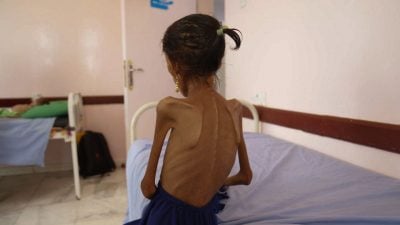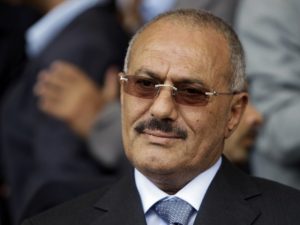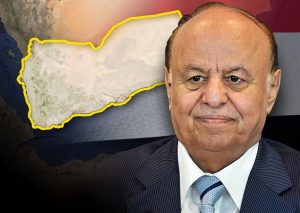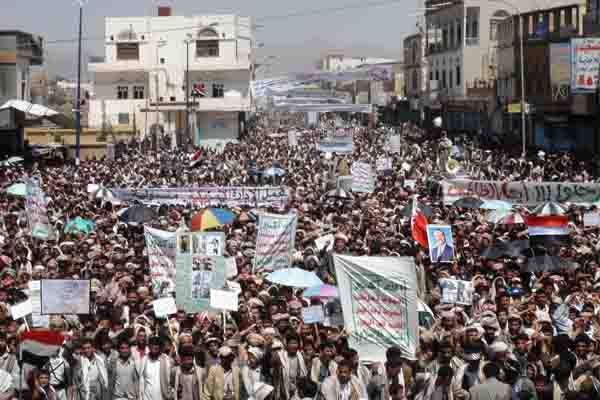It Is Now the “Israel-led” Coalition that Is Destroying Yemen
Is Trump's defiance of Congress to accommodate Israel treasonous?

It wasn’t supposed to take this long to eliminate the independence movement of the backward land of the living Bible. A coalition of the world’s major military powers, led by the US, Saudi Arabia, the United Arab Emirates, Britain and Israel, expected Yemen’s Houthi movement to fall in a matter of weeks after their attacks started on March 25th, 2015. Five years later, it is only the hidden member of the Coalition leaders, Israel, that is motivated to continue the genocidal bombing and blockade that has created “the world’s greatest humanitarian catastrophe”. It is arguably because of Israel’s hidden role that the genocide is continuing despite the attempts of the other Coalition leaders to end their roles in the Yemeni slaughter.
Until 2015, Yemen, one of the poorest countries on earth, was a fabulous, unspoiled country of ancient cities, thousand-year-old buildings and pristine islands; some scholars believe that Yemen may have been the site of the Old Testament. Socotra island, called the Galapagos of the Gulf, was one of Yemen’s four UNESCO World Heritage sites. The small, spectacular country had another ten tentative World Heritage sites.
Yemen has the misfortune to inhabit strategic real estate. Lying at the southern end of the Arabian peninsula, Yemen is bordered by Saudi Arabia to the north, the Red Sea down to the Bab el-Mandeb strait to its west, the Gulf of Aden to the south and Oman to its east. Its territory also includes islands in the Red Sea and around the Bab el-Mandeb strait. The strait, an 18-mile gap between the east coast of Africa and the Arabian peninsula, is a potential chokepoint for the heavily-used shipping route from the Suez Canal and the Red Sea to the Gulf of Aden and Indian Ocean.
Yemen’s struggle for independence from Saudi/western control
Yemen’s conflict with western powers arose when many Yemenis, like those in the Houthi movement, wanted to end their Saudi-controlled government’s support for the West’s so-called “war on terror”, such as its support for the destruction of Iraq and its approvals for U.S. drone strikes on Yemenis. The Houthis, also referred to as the Ansarullah movement, is a north Yemen Shi’ite sect that first organized politically to protest regional discrimination; they are more oriented to justice issues than to religion.
Yemeni independence from Saudi control seemed to be within reach after a successful Arab Spring rebellion in 2011 ended the 33-year presidency of Ali Abdullah Saleh (image on the right). Vice President Abdrabbuh Mansour Hadi replaced Saleh with a two-year term to oversee the transition to an independent government. In order to produce a new constitution and an electoral process for the upcoming 2014 election, a National Dialogue Conference was held in 2013-2014. Yemenis were disappointed with the results; the constitution resembled Iraq’s and the electoral process was not workable for Yemen’s parties. The conference results had been hijacked by the Gulf Cooperation Council (GCC) (1), an economic and security coalition of Gulf states allied with western interests. At the end of the conference, representatives of Yemen’s parties met to vote on whether to extend Mansour Hadi’s term to January, 2015; the Houthi representative, the dean of Sana’a University law school, was assassinated en route to the meeting. Negotiations between the Houthis and Hadi’s government broke down in the fall of 2014, at which point the Houthis, along with allies, started to take control of the government.
It was at this point, that the coalition of states that wanted Yemen to remain under Saudi/western control must have coalesced. The leaders of the Coalition, the US, Saudi Arabia, the United Arab Emirates, the UK and secretly, Israel, recruited other allies which have included France, Sudan, Egypt, Pakistan, Qatar, Bahrain, Morocco, Jordan, and Somalia. Tens of thousands of experienced mercenaries were hired, primarily from Sudan but also from Columbia and Nepal, as well as specialized organizations such as Blackwater and the Navy Seals.
It is ironic that the US, Britain and Israel, which claim to stand for democracy, were leaders in a coalition to ensure that Yemen would not be permitted its own democratic government.
President Mansour Hadi was forced to resign in January 2015, after his extended term had expired, and the Houthis started to put a new government together with other parties. In early February, the UN envoy to Yemen, Jamal Benomar, reported to the UN Security Council that all of Yemen’s factions were negotiating together to form a unity government. The news spurred the Coalition to action.
The Coalition sets United Nations Security Council up to destroy Yemen’s independence movement
The Coalition immediately acted to end the possibility of an independent Yemeni government by obtaining legal cover to protect its planned aggression. Just one week after Jamal Benomar had reported that Yemen’s factions were negotiating to form a government, UN SC Resolution 2201 was passed, which permitted military action to force the return of Hadi’s Saudi- backed government and the implementation of the (Yemeni-rejected) GCC- backed constitution and electoral plan. Hadi quickly withdrew his resignation, creating a legal morass. The Coalition attacks started several weeks later, on March 25, 2015, just before Hadi fled to Saudi Arabia and called on it to bomb Yemen to reinstate him.
Three weeks after the start of the attacks, the UN SC passed Resolution 2216 which grotesquely blamed the Houthis for the violence, insisted that the GCC- backed plan of government be implemented, that the “legitimate” Mansour Hadi (image on the left) government be restored, and it called for an arms embargo on the Houthis.
While giving lip service to Yemeni sovereignty and territorial integrity, the Security Council resolutions gave the Coalition the tools and the legal cover for its destruction of Yemen.
The various motives of Coalition leaders
While the Coalition was supposedly attacking Yemen in order to restore the Saudi-backed government, it soon became apparent that some Coalition leaders had the ulterior motive of grabbing Yemen’s strategic real estate. Saudi Arabia quickly occupied Yemen’s Hanish islands in the Red Sea, and part of Socotra island, at the mouth of the Bab el Mandeb.
The UAE created Yemen’s separatist Southern Transitional Council (STC) party, aiming to assume ultimate control of the south of Yemen, including Aden and other ports. “President” Hadi gave the UAE a 95-year lease of Socotra island and the UAE offered Emirati citizenship to its residents. The UAE is building a base on the island; the U.S. and Saudi Arabia are expected to follow suit.
As its price for participating in the Coalition, Israel demanded that it be given the use of Yemen’s strategic Tariq air base, near Yemen’s third largest city of Taizz. Israel, which usually invokes its “security” to justify bombing Syria or occupied Gaza, claims that control of the Bab el-Mandeb strait is another “security” requirement because most Israeli shipping passes through that strait. To monitor strait traffic, Israel has already acquired bases in Eritrea and has the apparent use of Yemen’s Perim island in the strait (2).
Israel’s role in the coalition
Yemenis discovered Israel’s role in the coalition soon after the attacks started. When they downed two planes in an initial attack on its air defense system, they noticed that something didn’t add up: while the planes were marked as belonging to the Saudi air force, they were F-16s that Saudi Arabia had never possessed. In fact, they were Israeli planes with Israeli pilots disguised to appear Saudi. (3) Days later, what many observers identified as a neutron bomb was dropped on Yemen (4); while no country admitted responsibility for it, there were few countries other than Israel with the ability or motive to commit such an act. Israel’s ongoing participation was confirmed a couple of months later when a Yemeni attack on a Saudi base killed 20 Mossad officers along with 63 Saudi military planners.
It appeared that while Saudi Arabia, along with the UAE, were paying the bills, the attacks were directed by American and Israeli surveillance and military planners. Israeli “cyber companies, gun traders, terror warfare instructors and even paid hit men” were part of the coalition’s workforce. When the Saudis decided to take control of Houdaydah port, through which an estimated 90% of Houthi food and humanitarian aid passed, it was Israel Defense Force instructors that trained Coalition mercenaries in Israel’s Negev desert. Although there has been no subsequent publicized evidence of Israeli air attacks on Yemen — since Yemen is no longer able to down planes to identify them — many of the hundreds of thousands of “Saudi” bombing attacks could be Israeli. While Saudi Arabia claimed it was offering a unilateral ceasefire on April 8th as a peace gesture, there was strangely no let up in “Saudi” air attacks on Yemen.
Yemen crucified: “Yemen has all but ceased to exist as a state”
Since the vicious western-backed invasion of Yemen started, the Houthis have become more popular than ever in Yemen. But the cost to Yemen has been horrific, with the magnificent ancient land and infrastructure not only in ruins but, like parts of Iraq and Vietnam, too contaminated with radioactivity and toxic chemicals to support life.
Yemen is now divided in three parts, with the Houthis controlling the northern third of the country with 70% of the population, the separatist STC, backed by the UAE, declaring its session of the south of Yemen, including Aden and southern ports, and the east of Yemen under Hadi’s contested control.
The UN calls Yemen “the world’s greatest humanitarian catastrophe”. A quarter of a million of Yemen’s 30 million population have died and significantly more than that have been injured. An estimated 10 million are starving; 80% need aid to survive. Hundreds of thousands of children have died of starvation and many have died after being forcibly recruited as child soldiers by Saudi Arabia.
The Coalition’s members should face the International Criminal Court because most of their attacks indicate a genocidal intent. Only a third of the 250,000 bombing attacks have targeted the Houthi’s military: the majority target civilians and infrastructure, such as the bombing of over 1,000 mosques, most of the hospitals and medical facilities, farms, food markets and food storage buildings, factories, water treatment plants, schools and school busses, weddings, funerals, and even a rally of 100,000 in support of the Houthis. The UAE and the Saudis prevent Yemeni fishermen from fishing and have destroyed thousands of fishing boats. The UAE and Saudi Arabia have operated unmonitored torture facilities in Yemen in which an unknown number have perished.
The Coalition has used illegal, banned weaponry against civilians such as skin-melting white phosphorus. Despite holding international aid events to raise money for humanitarian aid for Yemen, Saudi Arabia blockades the food and humanitarian aid from land, sea and air — and has been documented stealing food that did reach Yemen. When Yemen suffered the worst cholera outbreak in history, the Coalition tried to block medicine. To ensure that Yemenis caught the COVID-19 virus, Saudis dropped what were believed to be infected masks on the most densely- populated Houthi areas and had infected people go to Yemen. Yemen’s health system collapsed.
Every two hours one Yemeni woman loses her life in labor because of the lack of obstetric help. (5)
The destruction of Yemen’s cultural heritage is reminiscent of the US destruction and theft of Iraq’s antiquities. Despite UNESCO providing the Coalition with the coordinates of the World Heritage Sites, these sites — often remote– were bombed, as well as major Yemeni museums. There has been a lively market for Yemen’s antiquities, which have been appearing in auction houses and museums, with Judaica particularly popular in Israel.
Sabotaging peace
Because the purpose of the Coalition’s attack on Yemen is to ensure a western puppet government, the Coalition has sabotaged all peace initiatives that would have included the Houthis in future governments. The Houthis were blamed in 2018 for not attending peace talks in Geneva: the Saudis, who controlled the airspace, would not allow them to attend! The Dec. 2018 Stockholm peace agreement on Houdaydah between the Houthis and the Coalition was not implemented despite the Houthis immediate compliance. The UN claimed the wording was too fuzzy to actually enforce.
Media misrepresentation
The Coalition claims that its war on Yemen’s Houthis is actually a “proxy” war with Iran, which, it claims, controls the Houthis: a claim that both the Houthis and Iran deny. While Iran sympathizes with the Houthis, there has been no evidence of control. Leaked State Department cables show that the U.S. government was well aware that the Houthis are not controlled by Iran. (6) The claim of Iran’s control, even if it had been legitimate, could not justify the Coalition’s devastation of Yemen and its people because Iran has not threatened any country. Some articles on war crimes in Yemen describe the guilt of “both/all parties”, ignoring the fact that the Coalition has no moral right to attack Yemenis, who have been forced to defend themselves.
Despite the Houthi’s overwhelming popularity in Yemen, mainstream media presents only the Coalition’s position as legitimate. The Houthis are described as the “Iran-backed Houthis” or the “Houthi rebels” even though 60% of Yemen’s military forces supports them. The rejected president and government is described variously as “legitimate President Hadi”, “the internationally recognized government”, or “Yemen’s government”. In reality, Yemenis would not accept Hadi’s return because of his demand that Saudi Arabia bomb Yemen to reinstate him. In 2017, Yemenis convicted Hadi of treason and sentenced him, in absentia, to death; he is widely reviled.
Yemen’s voice has been largely silenced: almost 300 Yemeni reporters have been killed and 23 media outlets damaged since 2015. The most recent murder, award-winning RT and AFP photojournalist Nabil Hasan al-Quaety, was shot by unidentified gunmen leaving his home on June 4, 2020.
Coalition members want out: so why is it still attacking Yemen?
Pictures of starving children in Yemen’s ruins as well as the Houthis spirited defense finally shamed the Coalition’s western members. The British Parliament and the U.S. Congress both tried to extricate their governments’ involvement in the Coalition by passing legislation that includes ending weapons sales to it.
The UAE announced in August, 2019, that it was finished with its role in the Coalition: it had what it wanted. Besides its 99-year lease on Socotra island, the UAE is expected to assume protectorate status of south Yemen if its STC party is successful in its secession attempts.
Saudi Arabia is in financial trouble and has long wanted a face-saving way to end its participation in the Coalition. It has not only paid $200 billion for weaponry and mercenaries, but it continues to cost Saudi Arabia over $53 million every day that it continues; it can no longer afford the bills and it has little to show for it. In May, 2020, it announced that it will no longer cover the Hadi government’s living expenses in Saudi Arabia.
Since the Coalition leaders want to end the war on Yemen, why is it continuing?
The answer came in award-winning journalist Vanessa Beeley’s March, 2020, interviews with Yemeni leaders. She was told the various ways in which the United Nations continues to betray the interests of Yemenis. While the UN praises Coalition leaders for pledged donations of $2 billion — at least 80% of which disappears or is skimmed off the top — the UN does not criticize the same leaders for their theft of $15 billion/year from Yemen’s oil and gas resources. The move of Yemen’s bank from Sana’a to Coalition-controlled Aden prevents Houthis from accessing bank services such as social assistance and paying for various kinds of aid.
The most stunning information came from Beeley’s interview with Yemen’s ambassador to Damascus, Naif Ahmed Al Qanes, who told her that that the initial coalition attack on Yemen started at dawn of March 25th, 2015 — the day that five Yemeni representatives, under the auspices of the UN and including Al Qanes, were to have met at noon to choose their new president. The timing of the attack ensured that the leaders of Yemen’s parties could not name a legitimate president or proceed with an independent government.
Al Qanes told her that only two Coalition leaders refuse to allow its war on Yemen to end: the United States and Israel, who will continue “until they get what they want”. (7)
The U.S. and Israel are forcing the Coalition to continue. To assign blame where it is due, the Coalition should now be referred to as the “US/Israel-led Coalition”.
Because of its hidden role in the Coalition, Israel has nothing to lose and everything to gain from the Coalition’s continuing attacks on Yemen. If Yemen’s independence movement is wiped out, Israel gains its base near Taizz as well as the silencing of a critical regional voice. In the meantime, Israel wants the supportive American military presence in the region.
Israel also has good reason to keep its role in Yemen hidden because it is responsible for the other “world humanitarian catastrophe” in Gaza. Israel is facing boycott, divestment and the threat of sanctions because of its treatment of the indigenous Palestinians: ethnic cleansing and apartheid in the occupied West Bank and East Jerusalem and in occupied Gaza, genocidal treatment as well as the theft of major gas resources off Gaza’s coast. Israel has blockaded food, fuel, medicine and other humanitarian aid since September, 2006, for two million incarcerated on land that a UN report declared too contaminated to support life. Israel’s ongoing attacks on Gazans since June, 2006, have killed thousands and demolished Gaza’s infrastructure.
Is Trump’s defiance of Congress for Israel’s agenda treasonous?
Trump won the presidency on a popular platform that included extricating the US from Middle East wars, and Congress has repeatedly passed legislation to end the American role in the Coalition. It cannot be clearer that Americans want to end the U.S. role in Yemen.
Congress has the right and the obligation to check the executive powers of the President when he oversteps them. President Trump appeared to overstep those rights when he fired the State Department Inspector General Steve Linick when he was about to publish a report criticizing Secretary of State Mike Pompeo‘s “emergency” lie to circumvent Congress’s ban on selling arms to the Coalition. Congress caught the Government sneaking further arms sales to the Coalition in June, 2020. Trump is defying Congress and the American public to satisfy Israel’s demand that the war on Yemen continue until the Houthis are defeated and Yemen has a puppet government.
Americans have been led to believe that the US and Israel share identical interests: they don’t. President Trump’s accommodation with Israel’s demand is not only destroying an innocent people fighting for independence, but it is damaging the Constitutional underpinnings of the American government.
*
Note to readers: please click the share buttons above or below. Forward this article to your email lists. Crosspost on your blog site, internet forums. etc.
Karin Brothers is a freelance journalist. He is a frequent contributor to Global Research.
Notes
1. Carapico, Sheila. “Yemen on brink as Gulf Co-operation Council initiative fails“. BBC. 25 February 2015. https://www.bbc.com/news/world-middle-east-31611241
2. ” How Israel Takes Advantage of Yemen Crisis?”. alwaght.com. 9 October 2017. http://alwaght.com/en/News/113413/How-Israel-Takes-Advantage-of-Yemen-Crisis
3. Lendman, Stephen. “US-Saudi- Israeli ‘Axis of Evil’ Against Yemen, Carefully Planned Military Undertaking”. Global Research. 31 May 2015.https://www.globalresearch.ca/us-saudi-israeli-axis-of-evil-against-yemen-carefully-planned-military-undertaking/5452667
4. Chossudovsky, Michel. “Possible Tactical Nuclear Strike (Neutron Bomb) in Yemen?” Global Research. 1 June 2015.http://www.globalresearch.ca/possible-tactical-nuclear-strike-neutron-bomb-in-yemen/5452876
5. “Aid workers warn more Yemeni women will die as UN cuts maternity funding”. Presstv. 4 June 2020. http://www.presstv.com/Detail/2020/06/04/626758/Yemen-women-childbirth-UNFPA-funding-Saudi-Arabia ,
6 Webb, Whitney. “ Netanyahu Declares Israel’s Readiness to Join Saudi-Led Bloody War on Yemen“. Mint Press News. 2 August, 2018. https://www.mintpressnews.com/netanyahu-declares-israels-readiness-to-join-saudi-war-on-yemen/246918/
7. Beeley, Vanessa. “Exclusive: Vanessa Beeley Interviews Yemeni Ambassador in Damascus”. UKColumn. 6 March 2020. https://www.ukcolumn.org/article/exclusive-vanessa-beeley-interviews-yemeni-ambassador-damascus




